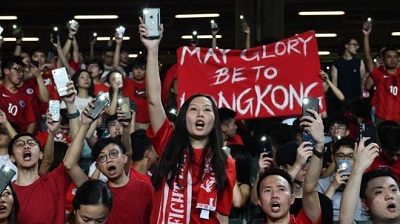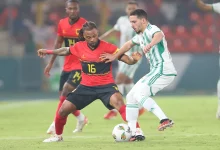
Hong Kong’s protest movement made its presence felt in a sports stadium and shopping malls on Tuesday.
Fans attending a football match drowned out the pre-game Chinese national anthem with loud booing.
Protesters have also staged flash events in shopping malls, singing Glory to Hong Kong which has become an unofficial anthem of the movement.
The protesters won a major concession last week when the extradition bill which sparked the unrest was scrapped.
But this has failed to end the unrest as protesters continue to demand full democracy and an investigation into allegations of police abuses.
On Tuesday night, thousands of protesters gathered in shopping malls across Hong Kong chanting slogans and singing Glory to Hong Kong.
In the popular shopping district of Mongkok, a sea of protesters dressed in black were seen congregating across the different levels of one mall.
Another video showed protesters chanting “Go Hong Kong” – a phrase that has been used frequently as a sign of encouragement.
Shopping malls have been the scene of clashes in recent weeks, with one incident in July seeing riot police fight battles with protesters inside a mall in the district of Sha Tin.
But the recent events have played out peacefully.
Glory to Hong Kong was written by a local musician in response to calls for an anthem for protesters.
The lyrics include lines such as “Do you feel the rage in our cries? Rise up and speak up” and “persevere, for we are as one”.
The new rallying cry has joined other popular songs used by the protest movement, including Do You Hear the People Sing? from musical Les Miserables and the Christian hymn Sing Hallelujah to the Lord.
It was also heard at the Hong Kong v Iran football match on Tuesday at Hong Kong Stadium.
The 2022 FIFA World Cup qualifier saw thousands of protesting booing when the Chinese national anthem played before the start of the game.
The jeering, which could be heard from outside the stadium, was intended as a clear “message” to Beijing that they do not want to be part of China in the future, says the BBC’s Nick Beake who was at the game. -BBC




